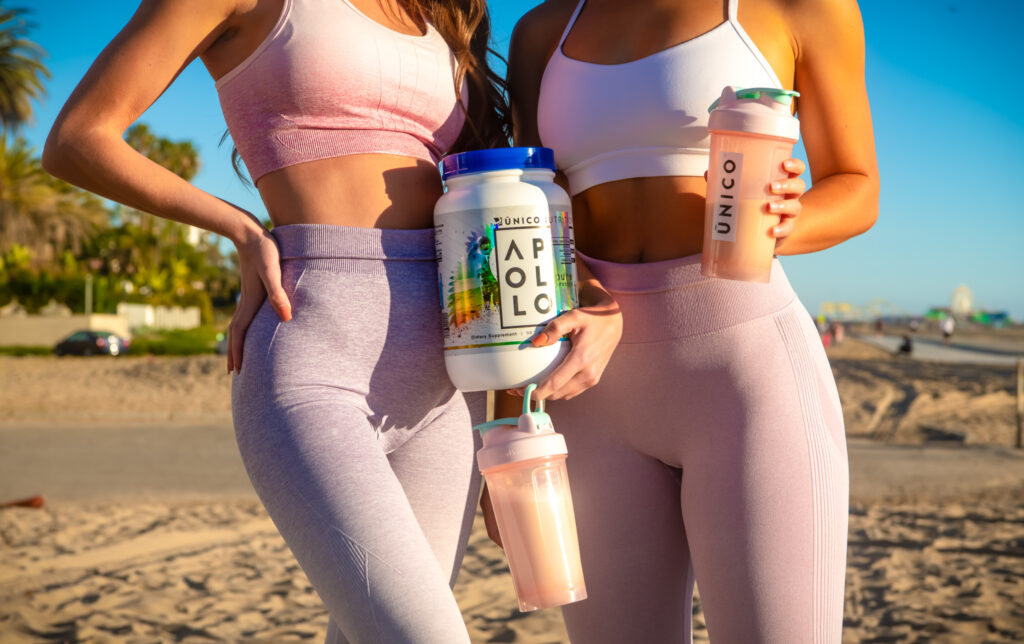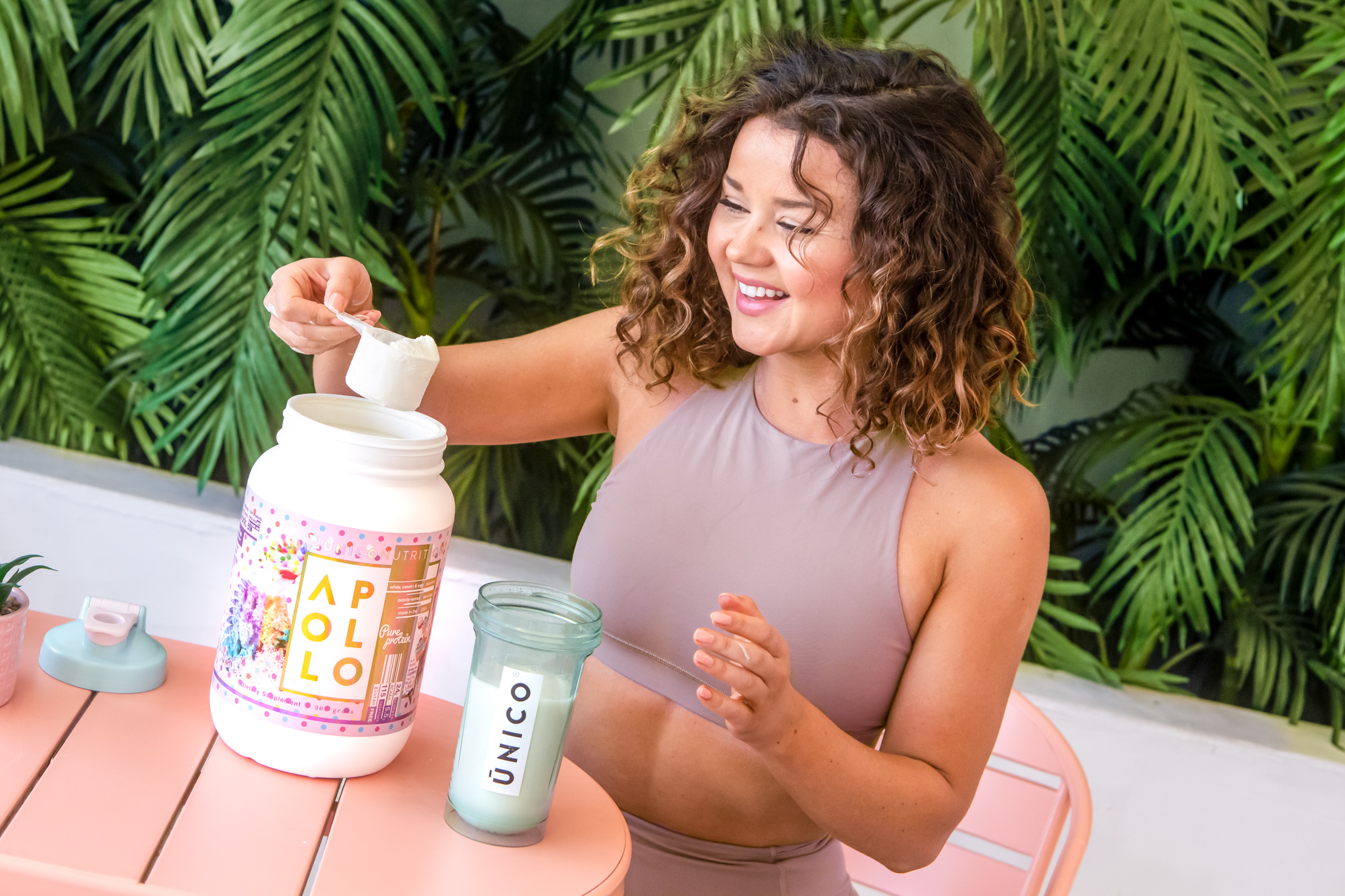So you’ve decided to try taking a protein powder supplement… But which should you choose? With so many different types of protein out there, it is hard to know which whey to turn (see what I did there?).
But fear not. While the protein landscape can be confusing, you’re certainly not alone.
Today we’re going to break down the different types of protein powder and help you pick the one that’s best for you and your goals.

The use of protein powders has skyrocketed in popularity in recent years, and for good reason.
A quality protein powder can be used to lose weight, build muscle, or even be used as a convenient meal replacement option.
Protein is an important component of any well balanced diet, and plays many unique roles in your body.
Studies have shown that high protein diets may:
- Enhance your workouts
- Improve recovery time
- Add more lean muscle
- Help you to lose fat1
With the seemingly never ending choices, trying to find the best protein powder may feel overwhelming and downright confusing!
The most suitable protein powder for you will depend on your dietary restrictions, health goals, and personal preferences.
For example, the best protein powder for weight loss may be one that includes whey or casein.
If you’re lactose intolerant, or following a vegan diet, then you’ll want to look for the best plant based protein powder to meet your needs.
And if you’re simply looking for something that is high protein and tastes like a dessert (birthday cake protein powder anyone?), you will certainly want to opt for an easy-drinking dairy-based protein.
What are Protein Powders?
Protein powders are powdered forms of protein that can come from milk, plants, or eggs.
They are produced by extracting the protein component of a whole food to create a powder that can then be added to a liquid like water or milk.
There are many different ways to extract and create different forms of protein powders – some of the most common forms are isolates and concentrates.
Protein powders are widely available and can be found in just about every brick and mortar and online retailer.
Can Women Use Protein Powders?
The protein powder market has historically catered to men looking to build muscle and ‘bulk up’.
However, this has created a slight misconception that women can’t also benefit from a protein powder.
The fact is that protein functions virtually the same way in both men and women.
This means that women can benefit from protein powders just the same as men.
First of all, there are plenty of women who are looking to healthfully add muscle.
I mean seriously – who said the gainz were only for guys?
Nobody. They are for all.
And for men and women looking to lose weight, protein powder is an excellent tool.
A higher protein diet can reduce your appetite and level of hunger which can help you eat fewer calories.
Most people don’t know this, but protein powder does help you lost weight through several mechanisms, including:
- increasing satiety
- elevating metabolism
- building lean muscle (which burns more calories!)
A protein supplement can also help prevent lean muscle loss which can help to maintain the efficiency of your metabolism.
And if that weren’t enough, using a protein powder may even benefit your bone health which can reduce your risk of osteoporosis and fractures.
For those looking to add muscle, protein powder is equally as effective.
The reason being that protein powders naturally contain all essential amino acids (also known as eaas) that you need to build muscle fast. (More on amino acids later!)
By combining a quality protein powder with a caloric surplus (meaning you eat more calories than you burn), you can build muscle mass quickly.
The best protein powders for women are those that meet their taste preferences, dietary needs, and overall lifestyle.
The Most Popular Types of Protein Powder
The protein used to make protein powders are derived from a variety of sources.
The most popular types of protein powders may include dairy-based protein from milk like whey and casein.
As people shift towards a plant-based diet, you’ll see more and more vegan protein powders on the market to choose from.
Vegan protein sources may include (in decreasing order by popularity)
- pea protein
- brown rice protein
- soy protein
- hemp protein
- quinoa protein
- sacha inchi protein
- duckweed (or lemna) protein
You may also come across egg protein powders which can be made from cage-free, pasture-raised, or from egg albumin.
Whey Protein
Chances are that you have heard of our first featured protein.
Whey protein is the most commonly used protein in protein powder supplements.
Whey is derived from milk, and is a water-soluble protein – meaning it blends easily with liquids.
Choosing a protein powder that can easily blend with water or milk is the key to ensuring that you don’t end up with an unpleasant, chalky texture.
Whey is also a complete protein, meaning it contains all nine of the amino acids (the building blocks of protein) that are necessary to meet your body’s needs for muscle growth and repair.
This popular type of protein is also rich in branched-chain amino acids, or BCAAs.
Of the nine essential amino acids, three are BCAAs which include leucine, isoleucine and valine.
Studies have shown that these BCAAs play an important role in promoting muscle growth and recovery after exercise.2
Recommended Reading: The difference between BCAA vs EAA
Research shows that amino acids function similarly, and are equally as effective for women as they are for men.
Whey protein is a fast digesting protein which may make it ideal for a pre-workout or post-workout snack.
There is also research to suggest that taking whey protein may decrease fat mass and increase lean muscle mass in people who are overweight or obese.
One clinical trial found that whey protein intake was associated with lower body weight, reduced fat mass, and smaller waist circumference among the study participants.3
For those who can tolerate milk products, whey protein may be a great protein powder option to consider to help people lose weight.

Casein Protein
Similar to whey protein, casein is derived from milk. However, unlike whey protein casein takes longer to digest making it ideal as a pre-sleep protein supplement.
Research suggests that when used before bed, casein protein may help build lean muscle mass and can help to prevent muscle breakdown as you sleep.4
Like whey protein, casein is also a complete protein, meaning it provides all of the essential amino acids your body requires.
Casein also provides a high amount of leucine, which can help with new muscle growth and recovery.
There is some research to suggest that casein protein may be more effective at promoting muscle growth and fat loss than whey protein.
One study compared the changes in body composition in overweight participants produced by three different treatment groups including those that took casein, those that took whey, and those that took a placebo.5
The researchers found that the people in the casein group had double the muscle growth and triple the fat loss compared to the placebo group.
This research suggests that casein protein powder may be superior to whey protein powder with respect to weight loss and may be the best protein powder for weight loss for people who can digest milk and milk products.
Pea Protein
Who knew that the humble pea could provide a large amount of protein?
It’s true – pea protein, made from the yellow split pea, is the world’s most popular vegan protein source.
This little legume contains iron and all nine essential amino acids that your body requires.
It is also a rich source of BCAAs including arginine which can increase blood flow and enhance your heart health.
Pea protein contains leucine, isoleucine and valine, all of which have been shown to promote muscle growth.6
You may be surprised to hear that pea protein might be comparable to whey protein when it comes to building muscle.
One clinical trial compared the impact of pea protein versus whey protein on muscle thickness and strength.
Researchers found that participants who took 1.8 ounces of pea protein daily experienced similar increases in muscle thickness as those who consumed the same amount of whey protein.7
Pea protein powder is completely plant-based making it an excellent option for people following a vegetarian or vegan diet.
Additionally, pea protein powder is gluten-free, dairy-free and free from the most common food allergens including peanuts, tree nuts, eggs, fish, shellfish, cow’s milk, wheat and soy.
This water-soluble powder blends relatively well into liquids without an unpleasant, gritty texture.
While most would still prefer the texture of a dairy-based protein powder like whey or casein, pea is about as good as it gets when it comes to vegan protein.
Brown Rice Protein
It may come as a shocker- but brown rice isn’t just a carbohydrate; it actually contains protein as well!
Brown Rice protein is another popular plant-based protein source found in many vegan protein supplements.
This protein is made through a process that creates a separation between the carbohydrates and the protein within rice.
Like many of the other protein powders, brown rice protein contains all of the essential amino acids, but is low in lysine.
For this reason, it is not considered a truly complete protein.
However, just because this protein source is lacking in one essential amino acid, it doesn’t mean it should be dismissed.
Fun Fact: Many protein supplements combine vegan protein sources so that all amino acids are represented evenly – a process called protein complementation.
In addition to providing an extra boost of protein, this supplement may also provide some far-reaching health benefits.
One 2018 study suggests that brown rice powder contains powerful antioxidants which can protect your body from damage caused by free radicals.
Protecting your cells from free radicals can reduce your risk of developing chronic diseases like heart disease, diabetes, and some cancers.8
Like whey protein, brown rice protein is digested easily and quickly making it an ideal protein for post-workout recovery.
In addition, some studies suggest that brown rice protein may be just as effective as whey protein when it comes to increasing muscle mass and strength.9
Egg White Protein
Egg protein powders (made from egg whites) provide an easily digestible, and high quality protein source.
Many traditional weight-lifters and fitness coaches still believe that egg white protein is the superior form of protein when it comes to building muscle.
That’s because egg whites contain all of the essential amino acids that your body can’t make on its own.
They are also very rich in leucine.
Leucine is the BCAA that plays the most vital role in muscle building, and is often referred to as the ‘anabolic amino’.
While egg protein powders do a fine job in helping you maintain and build lean muscle mass, they may be less effective in promoting weight loss.
Here’s why.
The protein powders that help most with weight loss are the ones that help you to feel fuller, for longer.
Egg white protein is not one of those proteins.
One study showed that compared to casein or pea protein, egg protein did not help participants with feelings of fullness as effectively as the other protein sources.10
Hemp Protein
Products derived from the hemp plant have gained a lot of interest in recent years.
These products can provide a host of health benefits, but there has been some controversy surrounding this often misunderstood dietary ingredient.
Most of the controversy stems from the confusion as to whether hemp powders contain THC, the psychoactive compound found in the marijuana plant.
Fun Fact: Hemp plants have less than 0.3% THC, an amount so little that they have no psychoactive effect when ingested. In other words, hemp protein powders will not make you feel “high”.
To make hemp protein, oil is extracted from hemp seeds and the remaining seed meal is processed into a fine powder.
While hemp isn’t considered a complete protein source, don’t count it out just yet.
Hemp is a rich source of beneficial omega-3 fatty acids which may make up for its lack of amino acids.
One 2018 review found that omega-3 fatty acids may help prevent a variety of health conditions including heart disease, diabetes, cancer, depression, and age-related cognitive decline, and rheumatoid arthritis.11
Hemp is an excellent form of protein supplementation for people who are sensitive to dairy or who are following a plant-based diet.
So, Which Protein Source is Best?
Using a protein powder is an excellent way to get more of this critical nutrient.
Whether you’re trying to lose weight, increase your lean muscle mass, or simply looking to eat a more well-balanced diet, almost everyone can benefit from a quality protein powder.
Choosing the best protein powder can be confusing, but here is a simplified way of comparing the various types of protein.
| Goal | Best Protein Powder |
| Gaining Muscle | Combination of Whey, Casein, Egg White (APOLLO Protein) |
| Losing Weight | Casein, Pea, Hemp |
| General Health, Maintaining Weight | Whey, Pea, Brown Rice, Quinoa |
| Meal Replacement | Combination of Any Protein with Superfoods / Greens |
| For Vegans | Pea, Quinoa, Brown Rice, Hemp |
Now. Keep in mind that while these recommendations depend on a specific goal, modern research is challenging some of the common beliefs about the advantages of one protein source vs. another.
NOTE: Many protein powders feature protein blends, which combine multiple protein sources in one product. For example, our APOLLO protein features whey, casein, and egg white to deliver the benefits and versatility that each one offers!
For example, most thought that dairy-based proteins were always best for gaining muscle.
But as the study referenced earlier found – a vegan protein might be able to produce the same results!
The best way to pick the right protein powder for you may be to experiment with different protein powder.
Preferences like taste & texture, digestibility, and let’s not forget cost, can be important determining factors as well.
Fun Fact: At UNICO, we sell protein powder samples to help you pick the right one for your preferences
In Conclusion
The best protein powder for you will depend on your goals, and personal preferences.
It is worth finding the right protein powder through the proper research & experimentation, as a quality protein powder will help you to meet your health goals, meet your dietary needs, and may also come with other far-reaching health benefits.
References:
1https://www.ncbi.nlm.nih.gov/books/NBK70804/
2https://pubmed.ncbi.nlm.nih.gov/28638350/
3https://pubmed.ncbi.nlm.nih.gov/21677076/
4https://www.ncbi.nlm.nih.gov/pmc/articles/PMC5188418/
5https://pubmed.ncbi.nlm.nih.gov/10838463/
6https://pubmed.ncbi.nlm.nih.gov/25628520/
7https://pubmed.ncbi.nlm.nih.gov/25628520/
8https://www.ncbi.nlm.nih.gov/pmc/articles/PMC6025443/
9https://nutritionj.biomedcentral.com/articles/10.1186/1475-2891-12-86
10https://pubmed.ncbi.nlm.nih.gov/22196620/
11https://www.annualreviews.org/doi/10.1146/annurev-food-111317-095850
Recommended Reading:
- The Pros and Cons of a Vegan Diet, According to a Dietician - March 29, 2022
- Does Collagen Reduce Cellulite? - January 11, 2022
- 6 Different Types of Protein Powder – Which is Best? - December 21, 2021
